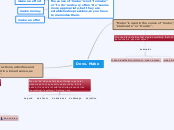von XimeniTa Quintero Ospina Vor 8 Jahren
464
Activity 06. Workshop

von XimeniTa Quintero Ospina Vor 8 Jahren
464

Mehr dazu
Examples
do exercise
do housework
do the dishes
do a job
do homework
make furniture
make a dress
make breakfast/lunch/dinner